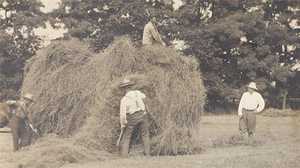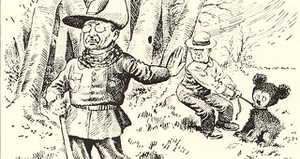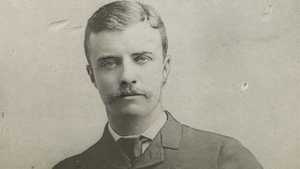TR's Foreign Policy

Theodore Roosevelt came to the presidency intent on expanding U.S. power abroad and with a belief that America should be strong and ready to defend its interests around the world. The former Rough Rider entertained boyishly romantic notions of glory on the battlefield. And it was only near the end of his life, when he experienced great personal tragedy during World War I, that Roosevelt truly realized the brutal nature of war.
Roosevelt influenced U.S. foreign policy even before he became president. As Assistant Secretary of the Navy under President William McKinley, he lobbied for a stronger Navy. Fearing the danger of Spanish control of Cuba, TR advocated war against Spain -- he even presented a written war plan to McKinley, which McKinley promptly ignored. When the U.S. battleship Maine exploded in Havana Harbor, Roosevelt was eager to place the blame on Spain.
Left in charge of the Navy for a day while his boss was away, the hawkish Assistant Secretary telegrammed squadron commanders in the Pacific and put them on high alert against Spain's Pacific fleet — a brazen usurpation of power. Two months later, the U.S. declared war on Spain, and Roosevelt resigned his Navy position to organize the First Volunteer Cavalry, known popularly as the Rough Riders, a motley mix of men from all walks of life. The gentleman soldier led his troops to a bloody victory on Cuba's San Juan Hill and returned home a bonafide hero, brimming with imperialistic fervor. He forever remembered his "crowded hour" in battle as the defining episode of his life and one that helped launch his national political career.
Following President McKinley's assassination in September, 1901, Roosevelt, then vice president, ascended to the presidency, bringing his imperialistic philosophy with him. Roosevelt had long advocated the building of a Central American canal, linking the Pacific to the Atlantic. In 1903, when negotiations with Colombia for a canal zone lease broke down, Roosevelt quietly supported a revolution in that country. Fighting began on November 3rd. Days later, with tacit support from TR, the independent country of Panama emerged from Colombian control, sporting an American-made declaration of independence, constitution, and flag. Panama rapidly agreed to American terms on a canal zone lease, and the U.S. Army Corps of Engineers began digging the following year.
In 1904, when the Dominican Republic defaulted on its European debt, Roosevelt drafted the Roosevelt Corollary to the Monroe Doctrine — the U.S. would freely intervene in any nation in the Western Hemisphere guilty of "brutal wrongdoing." When the Italian Navy steamed into the Caribbean to collect its due, Roosevelt enforced the corollary. Under pressure from Roosevelt, the Dominicans requested U.S. assistance. The U.S. took over collection of Dominican customs revenue, and set up a debt repayment plan, forestalling European intervention.
Fond of quoting the African proverb "Speak softly and carry a big stick," the militaristic Roosevelt was also capable of shrewd diplomacy and peace making. When Japan went to war with Russia over control of Manchuria and Korea in 1905, Roosevelt arbitrated the dispute. TR secretly agreed to Japanese annexation of Korea -- in return the Japanese promised to keep their hands off China, Hawaii, and the Philippines. The combatants laid down their arms, Roosevelt won the Nobel Peace Prize -- the first American to win the award -- and the U.S. strengthened its position in Asia and the Pacific.
In 1906, Roosevelt again brokered peace, this time when France and Germany squabbled over control of Morocco. Many believe that a peaceful resolution to this conflict delayed the start of World War I by a decade. A proponent of U.S. intervention in World War I, Roosevelt sneered at President Woodrow Wilson's neutrality, and was overjoyed when the U.S. declared war. His joy was short lived. All five of Roosevelt's sons served the Allied cause, and all returned safely save one. Quentin Roosevelt, TR's youngest son, was shot down in a dogfight on July 14, 1918. Roosevelt publicly maintained that it was better for Quentin to have served and died than not to have served at all, but the boy's death had a profoundly diminishing effect on the old Rough Rider. He followed his son to the grave less than six months later, on January 6, 1919.







